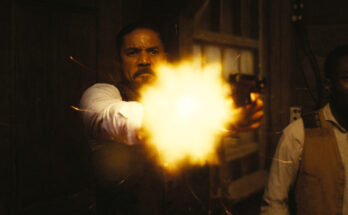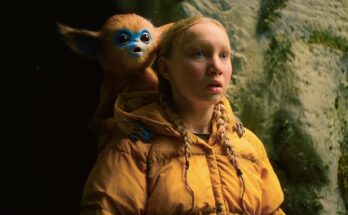Want to hear more from the actors and creators of your favorite shows and films? Subscribe to The Cinema Spot on YouTube for all of our upcoming interviews!
Get ready to lose your mind! The Wave, starring Justin Long, was released digitally through Apple and in select theaters today. That being said, it’s a film that might slip under the radar because of the few places it can be found. Make no mistake, though, its rarity is what makes it so special, especially when you consider the experience of watching the film itself…
The film starts off with a cliche line from Long’s character, Frank that hopefully will not lose you when it’s spoken since the film delivers on it in an eccentric way. His monologue redeems, continuing onto a personal tale from his college years when he participated in a scientific study. This all happens as the camera’s panning through the aftermath of a rager, moments of the night before phasing into the morning after, which gives the audience a taste of how blissfully trippy the visual effects are. The inflection of Long’s tone and where his story leads teases the narrative wonderfully and doesn’t reveal too much.
We cut to elsewhere in space-time, where Frank excels as a corporate lawyer profession, making money at the expense of others. Not only that, but his life is humdrum life is likely what makes his job so thrilling. Thus far, his character remains somewhat unsympathetic, as some part of us is hoping he ventures to rediscover himself. The cinematographic decisions leading up to his decision to do so perfectly contrast with one another, building to an awesome shot of Frank below the moon making the call to his co-worker, Jeff (played by the hilarious Donald Faison, best known as Turk from Scrubs).
On their night out, the ingredients are put into the pot churning the adventure everyone’s been talking about thus far. Introduction of the character Theresa (Sheila Vand) is teed up to be some sort of love interest for Frank, but the dialogue between the two of them speaks volumes of what the narrative is truly focusing on. The trajectories Frank is set in seem undeterminable and that’s what makes them so great.
The theme of risk reaches a high point (no pun intended) when Frank and Natalie walk into what turns out to be the trip of their lives. The wave the drug sends into Frank’s reality hits him and he wakes up the next morning. Thrills of his encounters and circumstances already send those watching into a whirlwind, the camera following Frank’s every move, every observation shows the intensity of his situations, especially at the twists and turns.
An epicly frightingening moment comes at one of the most anticipated moments for Frank that is revealing of what Frank fears the most, and when it hits, you’ll realize how powerful it is. It’s still lost to him, though, as he refocuses on Theresa. She, however, does become a lure for Frank to guide him spiritually. This is made apparent several times as the film plays out. There are paths that Frank is set on that appear as resolutions, but aren’t. He’s embedded in the mindset of risking it all, and the chaos that follows is the narrative pulling no punches with Frank or the audience. The two, in that sense, are in sync.
Frank is often questioned about what he considers to be reality, calling back to the simplistic theme the film establishes in its first minutes. It’s up to the imagination whether this is an adventure through dimensions or his psyche. The moments of reflection cause him to look at himself and the universe around him to realize an understanding.
This film doesn’t advocate drugs. Rather, it advocates in the most overall sense: adventure. The days of our lives are filled with possibilities to discover ourselves in what may be alluring to us instead of succumbing to the norm: mindsets such as following the dollar, which in some form is the antagonist of this film. We have to recognize what’s important in our lives, and when our thoughts align with that, only then can our universe be in harmony.
Its direction, although chaotic, reflects realistically how people would act being phased into these situations (1.5). Gille Klabin, for that reason, has a unique style, although similar to the minds behind Enter the Void, is highly intriguing. The cinematography from Aaron Grasso provides everything from depthful shots to enthralling environments that fit perfectly with the scenarios characters are in, as does the score (2.0). Acting, although quite authentic, did show these actors portraying roles they commonly do, making for no true standouts unfortunately (1.0). Frank was the only character that had true depth: his arc was apparent, but I was left wishing we dug deeper into Frank and further into those he encountered despite their relationships being solid at face value (1.0). The plot is intended to be a mess, and the pacing sporadic, but falls victim to the casual moviegoer getting lost. In terms of living up to an experimental film, though, it does a decent job, especially with its themes (1.3). Overall, this film earns a 6.8/10!
Check out the rest of The Cinema Spot’s website and social media outlets, and let us know what you thought of the film!




18 Comments on “You’re Having a Big Day, Baby: The Cinema Spot’s Review of ‘The Wave’”